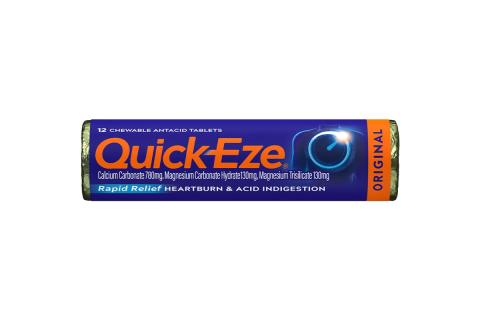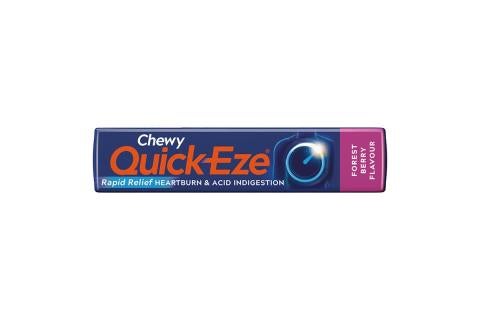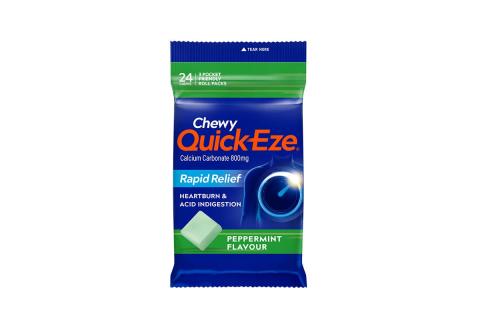Different Heartburn Remedies
Heartburn - that unwelcome guest that often arrives after a delightful meal or during a peaceful night's sleep, is something many of us are all too familiar with.
It is that burning sensation in the chest, that can be both uncomfortable and concerning. But what if you're among those who prefer to tread lightly when it comes to medication? The good news is you have options when it comes to finding heartburn relief.
The Quick-Eze® team are here to help you delve deep into the myriad of options available for heartburn relief, from the medical staples we've come to rely on to the more holistic, non-medical approaches that have gained popularity.
If you're someone who experiences heartburn but is hesitant about taking medication, you're not alone. Many individuals seek alternative heartburn treatments to manage their symptoms. In this guide, we'll explore both medical and non-medical approaches to treating heartburn, helping you make an informed decision tailored to your comfort and needs.

Over the Counter Heartburn Remedies
When dealing with heartburn, many people seek quick and effective relief by visiting their GP or local pharmacy. Among the various solutions available, there are three primary types of over-the-counter heartburn medications designed to provide heartburn relief. Understanding the differences between these options can help you make an informed choice about what works best for your needs. See the list below to explore these heartburn remedies.
Over the Counter Heartburn Medication
These are over-the-counter heartburn remedies designed to neutralise stomach acid quickly. Heartburn antacids provide rapid relief from heartburn and are available in various forms, including chewable tablets and liquids. Quick-Eze® tablets and Quick-Eze® chewable tablets are examples of antacids that offer fast relief in convenient forms. Whether you prefer the traditional compressed powder tablet or a more pleasant chewable antacid variant, Quick-Eze® has got you covered.
PPI (Proton Pump Inhibitors)
These are heartburn medications that reduce the production of stomach acid. They’re often prescribed for individuals with frequent or worsening symptoms of heartburn. Common PPIs include omeprazole, lansoprazole, and esomeprazole.
H2 Blockers
Another class of heartburn remedies, H2 blockers reduce stomach acid by blocking histamines. Examples include ranitidine and famotidine. They act slower than antacids but provide longer-lasting heartburn relief.
Prescription Heartburn Medication
For those experiencing persistent or severe heartburn, a healthcare professional may recommend prescription medications. These treatments are typically more potent than over-the-counter options and are tailored to address the underlying causes of chronic heartburn or gastroesophageal reflux disease (GERD). Common prescription options include proton pump inhibitors (PPIs) and H2-receptor antagonists, which work to reduce stomach acid production and provide longer-lasting relief. Always consult your doctor to determine the best treatment plan for your specific needs.
Natural Remedies for Heartburn
If you are looking to manage heartburn without medication, several lifestyle changes and natural heartburn remedies can be effective. The below lists include some recommended non-medical options for heartburn relief.
Lifestyle Changes for Heartburn Relief
- Dietary Changes: Certain foods can trigger heartburn. By avoiding these triggers and eating heartburn-friendly foods you can significantly reduce the frequency and severity of your symptoms. Common culprits include spicy foods, citrus fruits, tomatoes, and caffeinated beverages.
- Elevate the Head of Your Bed: Gravity can be your ally in the fight against heartburn. By elevating the head of your bed, you can prevent stomach acid from flowing back into the oesophagus (the hollow, muscular tube located behind your windpipe that connects your mouth to your stomach) while you sleep.
- Chewing Gum: Chewing gum can stimulate saliva production, which can help neutralise stomach acid and push it back down into the stomach.
- Weight Management: Carrying excess weight, especially around the abdomen, can put pressure on the stomach, leading to acid reflux. Maintaining a healthy weight can help in stopping heartburn.
- Stress Reduction: Stress can exacerbate heartburn. Techniques like meditation, deep breathing exercises, and yoga can help manage stress and, in turn, reduce heartburn episodes.
Home Remedies for Heartburn
Ginger: Known for its use in traditional medicine, ginger can help with nausea and may offer relief for heartburn when used in small amounts. Be mindful not to overdo it, as large doses of ginger could worsen your heartburn symptoms.2
Apple Cider Vinegar: Some people find relief from heartburn by consuming small amounts of diluted apple cider vinegar, as it’s thought to support digestive health. The evidence on this is limited but it’s generally okay to try in moderation.2
Baking Soda: Baking soda may provide relief by neutralising stomach acid. To use it, dissolve 1 teaspoon of baking soda in a glass of water and drink it slowly. However, this remedy should only be used occasionally. Consult your doctor to ensure it's safe for you.2
Bananas: Bananas can help soothe heartburn symptoms. Their high potassium content helps neutralise stomach acid, and their soft texture is gentle on the digestive system. Eating a ripe banana may help relieve heartburn .3
Do Home Remedies for Heartburn Actually Work?
While these remedies are commonly used, it's important to note that there is limited scientific evidence to support their effectiveness. Their impact can vary from person to person, so it's best to consult with a healthcare professional to determine what works for you.
When to Seek Help for Heartburn Symptoms
While occasional heartburn is common and can often be managed with lifestyle changes and over-the-counter heartburn remedies persistent or worsening symptoms should not be ignored.
You should seek professional help for your heartburn symptoms if you:1
- Experience heartburn regularly
- Find that your symptoms persist despite taking over-the-counter heartburn medicine
- Have difficulty swallowing or experience unexplained weight loss
- Notice blood in your vomit or stool
without
It's essential to consult with a healthcare professional delay.
Your doctor can provide a proper diagnosis, recommend appropriate treatments, and ensure there aren't underlying conditions causing your symptoms.
How Can You Prevent Heartburn?
Preventing heartburn often involves understanding and managing the factors that contribute to it. By identifying your personal heartburn triggers and making mindful choices like the healthier snack option, you can reduce the likelihood of discomfort. Balanced digestion, proper eating habits, and attention to lifestyle can play key roles in minimising the risk of heartburn
Selecting the Heartburn Remedy That Works for You
Navigating the world of heartburn remedies can seem daunting, especially with the many options available.
Remember, the journey to heartburn relief is deeply personal, and there's no one-size-fits-all approach. Whether you're reaching for a trusted antacid Quick-Eze® or exploring lifestyle changes, the most important thing is to find a solution that aligns with your comfort and needs.
Always remember that you're not alone on this journey. Whether seeking professional medical advice or sharing experiences with fellow heartburn warriors, Quick-Eze® is your companion on this journey to rapid relief from heartburn.
If symptoms persist, talk to your health professional. Always read the label and follow the directions for use.
[1]https://www.healthdirect.gov.au/heartburn
[2] https://www.healthline.com/health/gerd/heartburn-relief#medications
[3] https://thocc.org/about/news-press/news-detail?articleId=52210&publicid=395
Frequently Asked Questions
What helps heartburn fast?
Antiacids such as Quick-Eze® can provide rapid relieve from heartburn symptoms. Most antacids are medicines that counteract the acid in your stomach to relieve heartburn and indigestion. Antiacids are usually consumed as a liquid or chewable tablet and are available from pharmacies and grocery stores without a prescription.
How to relieve heartburn symptoms?
The right method to find relief from heartburn symptoms can vary from person to person. The most common approach to managing heartburn symptoms is through medications, such as antacids like Quick-Eze® or other over-the-counter remedies. There are also other non-medicinal heartburn relieve options you can try such as making changes to your diet and managing stress.
How to relieve heartburn during pregnancy fast?
Pregnancy comes with both its joys and challenges – heartburn is one of those challenges. Quick heartburn relief options like Quick-Eze® antacids are generally considered an appropriate first-line option for those who are pregnant. However, as per any medication during pregnancy, it is recommended that you speak with your healthcare provider before starting a new treatment. For more information, read our guide on heartburn treatment options during pregnancy.
How can I cure my heartburn naturally?
While it's possible to cure heartburn it is possible to manage the symptoms to relieve discomfort. Managing heartburn naturally involves making lifestyle adjustments and trying home remedies. Eating smaller meals, and avoiding common trigger foods like spicy dishes, citrus, caffeine, and fatty foods.
Does drinking water help heartburn?
Drinking water can sometimes provide temporary relief for heartburn by washing down stomach acid and reducing the burning sensation in the oesophagus. However, drinking too much water at once can distend the stomach and potentially worsen symptoms.






